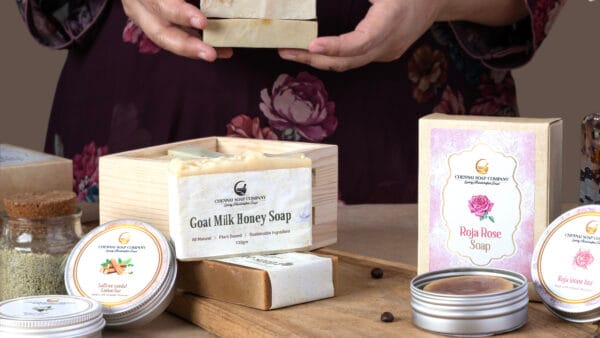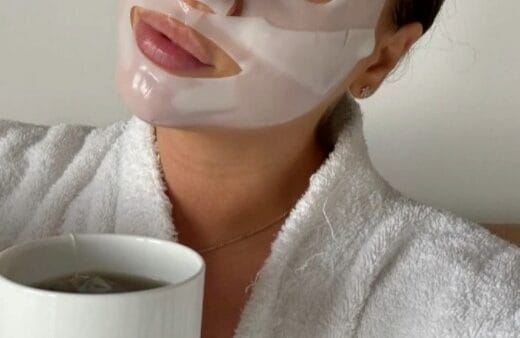We invited Dr. Nidhi Singh Tandon, dermatologist and founder of The Skin Art Clinic in Lucknow, because of the way she works with people. She doesn’t overwhelm you with information. She listens, explains, and helps you understand what your skin is reflecting emotionally and physically. There is a steadiness in her presence — the kind that makes you feel seen, not judged. With her, skincare becomes a gentler conversation with yourself. Over to Dr Nidhi and the Glow roadmap she has curated.
Have you ever noticed your skin breaking out just before an exam, a wedding, or a big work presentation? Or that dull, tired look after a few nights of poor sleep? It’s no coincidence that your skin is directly linked to your mind. In dermatology, we call this the “mind–skin connection.” What you feel inside often shows up outside.
Why does stress show on your skin
Your skin is not just a protective cover. It has its own stress-response system that mirrors the brain’s. Scientists call it a “peripheral hypothalamic-pituitary-adrenal (HPA) axis.”
Here’s what happens in simple terms:
When you’re stressed, your brain releases cortisol (the main stress hormone). Skin cells, such as keratinocytes and melanocytes, can also produce cortisol and carry receptors to respond to it.

This means skin can act almost like a “mini-brain,” producing and reacting to stress hormones locally. In the short term, this is protective, helping your skin fight sudden injury or infection.
But when stress is ongoing, the system goes into overdrive:
• Cortisol weakens the skin barrier. This increases water loss, making the skin dry, sensitive, and prone to irritation.
• Inflammatory pathways switch on. Nerves in the skin release neuropeptides like substance P, which activate mast cells. These cells then release histamine, leading to redness, itching, and flare-ups of eczema or hives.
• Oil glands become overstimulated. Stress signals prompt sebaceous glands to produce more oil, which can contribute to breakouts.
• Healing slows down. Stress interferes with collagen production and wound healing, so acne marks or post-procedure redness linger longer.
To put it simply, your skin is wired to your emotions through both hormones and nerves. This is why emotional stress can quickly translate into physical skin changes.
This is why many patients tell me, “My skin knows when I’m stressed, even before I do.
What you’ll notice on the surface
1.Acne that won’t settle when you’re under pressure.
2.Random rashes, hives, or itching with no obvious cause.
3.Dullness and lack of glow, even if your skincare routine hasn’t changed.
4.Flaky, sensitive skin that stings with products you normally tolerate.
This is why many patients tell me, “My skin knows when I’m stressed, even before I do.”
How to restore your glow?
The reassuring part is that the skin can recover. When we slow down, nourish well, and make small consistent shifts, the skin responds. These are top five practices supported both by research and by what we see, again and again, in real lives.
1. Rebuild your skin barrier
Think of your skin barrier as the “roof” that keeps moisture in and irritants out. Stress pokes holes in that roof. Repair it with:
• Ceramide-rich moisturizers: Ceramides are like the cement between skin cells. Creams containing ceramides, cholesterol, and fatty acids strengthen the barrier.
• Niacinamide (Vitamin B3): Found in many serums and creams, niacinamide reduces water loss, calms redness, and supports barrier repair.
2. Prioritise sleep
Sleep is your skin’s nightly repair session. When you don’t sleep enough, your barrier recovers more slowly, and your skin looks duller. Research shows people who sleep well actually have better hydration and faster healing. Aim for 7–9 hours of sleep and treat it like part of your skincare routine.
3. Calm the stress cycle
You can’t eliminate stress, but you can turn down its “volume.” Mind–body practices like meditation, yoga, or even 10 minutes of deep breathing reduce stress hormones. In psoriasis patients, adding mindfulness to treatment helped them clear faster. The skin listens when the mind is calmer.
4. Be gentle with Actives and procedures during high-stress times
If you’re sleep-deprived and stressed, your skin heals more slowly. This means peels, lasers, or microneedling may take longer to recover from. During such times, focus on barrier-first skincare (hydration, ceramides, SPF), and delay aggressive treatments until your skin is better supported.
5. Stay consistent with sunscreen
UV light itself is a skin stressor. Daily sunscreen doesn’t just prevent tanning and photoaging; it keeps the skin’s stress-response system calmer. Choose a broad-spectrum SPF 30+, ideally with barrier-supporting ingredients.
When to see your dermatologist
If stress is triggering major flare-ups like eczema patches, persistent acne, or psoriasis plaques, don’t just push through. Dermatologists can combine medical treatments with lifestyle strategies to reduce inflammation and its triggers. Remember: stressed skin is treatable skin.
The takeaway
Glow isn’t just about the right serum or facial. It’s about balance. When stress rises, your skin’s barrier weakens, healing slows, and inflammation spikes. The solution lies in a two-way approach:
Outside-in: protect the barrier with ceramides, niacinamide, and sunscreen. Inside-out: manage stress with rest, routines, and mindfulness.
Your glow, in the end, is as much about peace of mind as it is about skincare.
ALSO READ:
Decoding Neuroglow: Here’s How to Boost Your Skin’s Radiance by Nurturing Your Mind, a Dermat’s POV
If You Don’t Own These 13 Makeup Basics Yet, You’re Missing Out
Perfume, Memory, and Legacy — Reimagined by a Gen Z Brand Strategist





